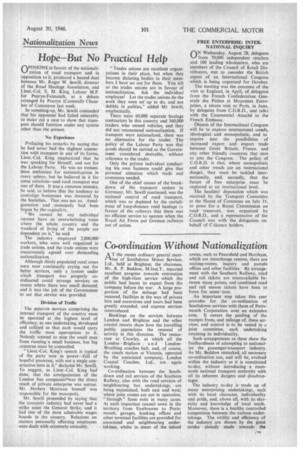Hope—But No Practical Help O PINIONS in favour of the nationalization
Page 25

If you've noticed an error in this article please click here to report it so we can fix it.
of road transport and in opposition to it, produced a heated duel between Mr. Roger W. Sewill, director of the Road Haulage Association, and Lieut.-Col. E. M. King, Labour M.P. for Penryn-Falmouth, at a debate arranged by Penryn (Cornwall) Chamber of Commerce last week.
In summing-up, Mr. Sewill contended that his opponent had failed miserably to make out a case to show that transport should function under any system other than the present.
No Experience Prefacing his remarks by saying that he had never had the slightest connection with transport in any of its forms, Lieut.-Col. King emphasized that he was speaking for himself, and not for the Labour Party. He was no tremendous enthusiast for nationalization in every sphere, but he believed in it for some activities—and road transport was one of them. It was a common mistake, he said, to believe that the tendency to centralize businesses was invented by the Socialists. That was not so. Amalgamation and monopoly had been begun by the capitalists.
"We cannot let any individual interest have an overwhelming voice where the whole country and the standard of living of the people are dependent on it," he said.
The industry employed 2,000,000workers, who were well organized in trade unions, and the trade unions were unanimously agreed over demanding nationalization.
. Although thinly populated rural areas were now continually crying out for better services, only a system under which transport was properly coordinated could arrange services on routes where there was small demand, and it was the job of the Government to see that service was provided.
Division of Traffic The separate services comprising the internal transport of the country must be operated at the highest level of efficiency, as one undertaking, developed and utilized so that each would carry the traffic most appropriate to it. Nobody wanted to stop the small man from running a small business, but big concerns must be controlled.
"Lieut.-Col. King's speech is typical of the party now in power—full of hopeful promises, with not a single constructive item in it," declared Mr. Sewill. To suggest, as Lieut.-Col. King had done, that the amalgamation of the London bus companierwas the direct result of private enterprise was untrue. Mr. Herbert Morrison himself was responsible for the monopoly.
Mr. Sewill proceeded by saying that the transport industry had never had a strike since the General Strike, and it had one of the most admirable wages hoards in the country. Relations on matters personally affecting employees were dealt with extremely amicably. " Trades unions are excellent organizations in their place, but when they become dictating bodies to their members I have no use for them. You tell us the trades unions are in favour of nationalization. Ask the individual employee! Let the trades unions do the work they were set' up to do, and not dabble in politics," added Mr Sewill, emphatically.
There were 60,000 separate haulage contractors in this country and 360,000 traders who owned vehicles, and they did not recommend nationalization. If transport were nationalized, there was no alternative for the trader. The policy of the Labour Party was that goods should be carried as the Government considered desirable, without reference to the trader.
Only the private individual conducting his own business could give that personal attention which trade and commerce needed.
One of the chief causes of the breakdown of the transport system in Germany, Mr. Sewill continued, was the national control of road transport, which was so depleted by the curtailrnent of long-distance road haulage in favour of the railways that there was no efficient service to operate when the Royal Air Force put German railways out of action.
FREE ENTERPRISE: INTER. NATIONAL INQUIRY
ON Wednesday, August 28, delegates from 70,000 independent retailers and 100 leading wholesalers, who are members of the Council of Retail Distributors, met to consider the British aspect of an International Congress which is being organized for October.
The meeting was the outcome of the visit to England, in April, of delegates from the French Confederation. Generale des Petites et Moyennes Entreprises, a return visit to Paris, in June, by delegates from C.O.R.D., and talks ' with the Commercial Attache to the French Embassy.
Objects of the International Congress will be to explore international trends, ideological and monopolistic, and to inquire into the possibilities of increased export and import trade between Great Britain, France. and any other friendly countries that care to join the Congress. The policy of C.O.R.D. is that, where monopolistic and other trends are an international danger, they must be tackled internationally, and, secondly, that the future of free enterprise must be explored at an international level.
The hauliers' deputation which was received by the Transport Committee at the House of Commons on July 31.. to press for a Royal Commission on road transnort, was organized by C.O.R.D., and a representative of the Council was wifh the delegation on behalf of C-licence holders.




































































